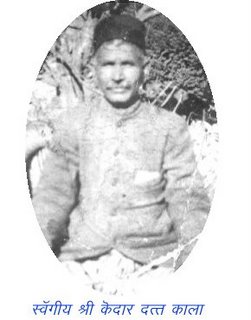Tuesday, December 26, 2006
Death: Terminus or Interface?
‘Purpose’ is so imbedded in our psyche that it is not possible to visualize life without it. We see everywhere activities meticulously following a pre-ordained objective. But then there are also random dispersal of events occurring spontaneously which are ejected out of mind as irrational. Often we assign them abstract purposes. Religion plays an important role in devising objectives to such random occurrences.
Therefore our inability to visualize life without an objective is similar to our inability to visualize warping of three dimension spaces. But space too warps and it is a fact of life and therefore there is no reason why death could very well be ‘Terminus’ and not an ‘Interface’ signifying perpetuality of life.
Broken Car
The car’s number plate on the back dangled on one end. The owner apparently was not interested in correcting the anomaly. Every time he looked at the car it annoyed him. Some thing eerie about it, very irritating in otherwise a perfect car.
Just as this piece of writing.
Monday, December 25, 2006
Funny Story This!
Bhartrihari, the ancient ascetic wrote several compendiums of hundred verses each on subjects such as Shringar, Nature etc. Pleased, Yama offered him 100 years of fruitful life in the form an ‘Apple’ to be eaten. Bhartrihari loved his wife very much and therefore the Shringar verses. So instead of eating the fruit he offered it to his wife. Now wife loved somebody else; a General in the kings court. So she offered it to the General. Again, the General in turn was infatuated to a maid in the court and naturally offered the fruit to her. As is predictable, the story doesn’t end here, the maid obviously was in awe of the king therefore the fruit went to the King.
King naturally wasn’t impressed so called for a thorough enquiry to get to the bottom of the truth. When the truth was revealed, Bhartrihari was completely devastated and took vairaagya and eventually ended up writing hundred verses on Vairaagya.
What happened to the Apple?
Tuesday, December 19, 2006
Wednesday, November 29, 2006
Buddha was wrong!
True, nothing matters if you don’t exist. But what exist isn’t only bad. Death, old age and sickness are all part of life but so is exhilaration of creation.
Saturday, August 26, 2006
Opaque !
Her's was a strange family. Whenever he visited their home he felt like a bird in a golden cage. Even though all seemed soft and dripping of hospitality, there was an uneasy sense of having intruded into their busy schedule. A signal that you are welcome here but we have things to do. They were all soft spoken and made every effort to make you comfortable yet you could note a zombie like focus in their behavior; an obsession to achieve a preordained objective. During my several visits to their home a clearer sketch of a highly focused family emerged. The Child wanted to please her parents and parents completely focused on their child's success, initially in studies and as a consequence of it later in life. An unreal collaboration on the basis of subtle inferences, queer glances. The effect was there for any one to see. It was strange that there were never direct commands in the girl's household. In fact to a casual observer it would have been impossible to detect the staggering weight of weariness in that house. For instance when mother made a suggestion to the girl," Would you like to study now!" It was an oblique command, "We must study now." She herself wasn't focused on studies but her constant endeavour was to see her parents happy, therefore she studied very hard as this made her parents happy. He heard incredulous people speculating, whatever could be the reason for this successful girl to hang herself? Funny! Now that there was no one to make happy( both parents dead), the girl lost the script and purpose in life.
Thursday, March 09, 2006
Looking for Void in Banares

Some twenty years back passed through Banares, sucked in it’s smells, sounds and images for an hour and moved on. But then I lived in Allahabad for a few years and I believe Banares is but only a lot more intense Allahabad. Crimson towns these! Paan chewing men looking at heaven while talking to you until their mouth saturated with saliva and splat! The wall gets colored. Arms sporting colored threads, saris, bangles, gamchas, bindies, hard cover of holy books and the cloth that wraps them, fluttering flags atop temples and ugly unplastered walls of houses; everywhere shades of red. From distance these places look inanimate, trapped in a forgotten time warp yet like anthills bustling with activities inside. These antiquated microcosms provide a sense of Gulliver to big town folks who occasionally deign to descend on these insignificant places and seek abstract.
But looking for ‘Nothing’ in Banares is a mistake, instead look for ‘Void’. Buddha in me says these words connote different things and I tend to agree. Void is everywhere permeating everything. You could see it in the wrinkles of that rickshaw-puller politely trying to strike a conversation, in the hollow boast of boatman, in the beady glazed eyes of shocked widows, and blank innocence of orphaned children and awed bystanders.
It must have been at the place where bomb exploded and surely in the mind of brainwashed zombie who planted the bomb.
But ‘Void’ is not a substitute for ‘Nothing’ if you want nothing but ‘Nothing’
Saturday, February 25, 2006
The Body Collectors
Joshi was short and lean, his weight never touched fifty Kilograms, mostly hovered at forty-eight kg. His lips curved at the ends crookedly giving out a look of repulsive lusty leer, yet he literally, or shall we say pictorially was an iconoclast. He demolished the myth so emphatically that girls go after tall handsome muscular men. To our searing jealously and frustration, we found Joshi always in the company of prettiest girls. Whenever I felt a bout insomnia I would go to Joshi and ask, ' Joshi, "Kasim Ka Jootaa" sunaa!" You must have heard this story from Arabian Nights, in which Kasim makes for himself a steel sole shoe due to leather shoe wearing quickly but finds steel shoe hard to use so chucks it away. Unfortunately it lands on neighbors glassware. Angry neighbor throws it right back supplementing with some choice invectives. Next Kasim throws the shoe in a river but a fisherman finds it trapped in his net, the net badly damaged, he too returns the shoe to Kasim with abuses and so on. Some times Joshi would oblige, he was quite inventive and could go on and on with the narrative ad-nauseam until one fell asleep.
We mostly listened to Hindi film songs broadcast from "Vividh Bharati" station and evening Hindi news from Devki Nandan Pande in his deep baritone. The English news came to us from Surjit Sen; these two gents had become synonymous with the news until TV sent the radio into oblivion. The speaker in the radio was unique, it did not have permanent magnet instead a bulky electromagnet. It took ages to warm up and begin spurting out sounds, enough to drive today's kids crazy. A year in the hostel, the speaker burned. Our College was a few kilometers away from town but there was a cluster of shops on the highway slightly off the college gate. Jha found a radio mechanic in the 'hauli' (village pub) so one day we dragged the bulky set into the lap of this mechanic and forgot.
Jha was an amiable character well liked by all. He was a genius, would help us with assignments and projects even though he had different subjects than us. But Jha could be bull headed on some rare occasions and then it would be very difficult to get him round to senses. We had forgotten all about my radio, when a month later a fellow, who was regular to that 'hauli', yelled at me, "abe Kala, 'hauli' men tera baajaa baj rahaa hai." There was nothing in that direct pun to be upset about, this was typical college lingo.
Five of us set off for ‘hauli’ to retrieve the radio. There was a room next to ‘hauli’ without any door where this radio mechanic worked. We found the radio in this room going full blast, a raucous Lata blurting out "Jaao jahan kanhin ankhoN se door, dil se na jaoge mere hazoor......" a song from movie Professor. There was a big hole in the metal box where speaker used to fit, instead a meter long yellow and red twisted wire came out of the gaping hole attached to a free speaker. This speaker was placed on the mouth of a ‘matka’ as a result all percussion sounds turned in to ‘ghatam’ beats.
Jha immediately got hold of this radio mechanic by his shoulders, shook him and began a noisy quarrel with him. All this commotion drew a big burly man out of hauli, a very big man. He placed his heavy hand on Jha’s shoulder and said in a chilling but controlled voice, "How do you think I run this ‘hauli’?" That was clear signal for us to pull Jha away. Soon a compromise was reached; I paid some money, which probably was equivalent to my whole month’s cigarette expense. We collected the radio and also the matka in typical Mullah Naseeruddin style, ‘gadhe ke saath kaathi bhi.’ Matka wasn’t such a great idea because we soon got tired of matka resonance but without sound box bare speaker sound too was not good so a routine emerged. Anyone coming will immediately remove the speaker from matka if it was there and if it was not on matka then put it on matka.
It was either early winter or fading winter; the time of year when sun is unpleasant but inside too is not very welcome. In the afternoon I with Jha, Joshi and another fellow were lying on bed resting out heads against the wall and legs placed on the table across the bed. This was afternoon therefore no film songs program was on air instead an unknown radio artist was playing sitar, speaker resting on top of the matka. Joshi was relating of yet another conquest of his. He apparently was in town a few days back to see Deewar (Amitabh Bachan). There was huge rush to get tickets so he sweet talked two girls to buy ticket for him (girls had separate queues). The girls agreed and bought him a ticket, ticket having seat number between theirs. The rest was usual how he first held their hands and then gradually worked his way up arms..…..,,, Unhappy, we asked him to "Shut up! Shut up! Just shut up!" He looked at us bewildered, shrugged and dozed off. Sitar apparently was incredibly good for in a synchronous act we all dozed off in unison. I had queer dream, very short but with crisp clarity. I wasn't in the dream but I saw a room or rather a hall with very little furniture and airy windows without curtains, very quiet and inanimate. The hall was littered with bodies on the floor in most disorderly way. Suddenly a man rises says, "baRi THhaNd hai, aik laash oDh letaa huN" and then this zombie picks up a body lies down and lays the body over him. Until the man spoke I didn't know they were all corpses. At this point I woke up with a start. Others too woke up. When I told them about this dream, their first reaction was of an incredulous sense of bizarre. Joshi soon recovered and rationalized, "Abe tere ko THaNd lag rahi thii is liye aisaa dream huaa!" That made sense.
However, this surrealistically cryptic, symbolic dream made such a deep impact that it permanently lodged in a secure recess of my memory like a MPEG4 clip, crisp and clear. I see run and rerun of this clip often with crystal clarity perhaps colors have faded or may be colors were never there in the dream. Years later in Bombay, a couple of days of saturation TV images of rioting, when I was on terrace of my building laud noise of crazy men drew my attention towards Array woods on east. I saw a bearded man in ankle high salwar, a woman and two young boys being chased by a frenzied crowd of some twenty, twenty-five men wielding swards, a triangular saffron flag and lathis. The family, it they were a family disappeared behind the cluster of Array woods before the crowd could catch them. I rushed down home shaking like a dried leaf. Soon I began to have uncontrolled run and rerun of that bizarre dream. Words began to pour out incoherently and then crystallized in clear text:
Markaz-e-shahr se nighahoN ke CHor tak,
Sil-sile dar sil-sile laashoN ke DHer haiN.
Chitke aaine meN, uBHar te haiN chaNd aks
Pighalti ghaRiyoN meN baNd, THahra hua hai waqt
QaatiloN ke Khauf ki na baat poochiye
RoohoN ko bhi toRte dam dekhte haiN ham
Mere ODh lene se laasheN abhi garam haiN
Ya, laashoN ko odh ne se sihran nahi hoti
*****
Saturday, January 14, 2006
Blue Eyed Cloud

I need to tell you this story so that you can fully appreciate the context and full range of emotive substance of this poem. It was some thirty years back that my friend Arvind Gupta, a literary freak, recited this poem to me. Those were the days of seventies, of meaningless angst. Almost every other intellectual was sort of a comrade. I was actually a 'be-pendii ka lotaa', a guy having no allegiance to any particular philosophy and would sit in all sorts of mehfils be a comrade expounding theory of Marx or RSS Pracharak singing 'apni dhafli apna raag' or a congress guy sinking into Gandhian nostalgia. All of them had one common feature, they chain smoked and gorged tea after tea while pouring wisdom at faithfuls. Arvind too was a mild (confused) commie, so one day in the hostel canteen we were having discussion over Marx over cups of tea, I mostly disagreeing with him. We then switched conversation to literature. I had kind of ambivalent attitude towards literature, I liked fiction but poetry wasn't my cup of tea. While talking about modern poetry or non-poetry (a-kavitaa) as I described it; in a kind of spoof I told Arvind this 'nai kavita' stuff is all 'bakwaas' and I can do much better job than these jerks and as an example uttered these lines:
Zindagi aik mariyal kutta hai,
Jo phati nekar pahne,
MuNH meN bujhi beeRii lagaye,
Seedhi saRak men bhi
Seedha nahi chal paataa.
Arvind, to my amazement quite liked these lines, which I didn't think was poetry at all but who am I to discourage any one appreciating my creative work! So in a reciprocal arrangement he recited this poem to me. And thereafter every time we met, I would recite my 'mariyal kutta' and he would recite this poem softy in his inimitable style. He told me that it was published in 'Parag' a children's magazine (now defunct). He had forgotten the poet's name. The poem is in twilight zone of Urdu-Hindi, perhaps more Hindi than Urdu but you will have no difficulty in understanding it.
Kal woh jo,
Neelee aNkhoNwaalaa baadal,
Ghoom rahaa thaa
Aasmaan men bastaa lekar
Kabhi idhar, kabhi udhar,
Aur hawaa ki uNgli pakRe,
Joote muNh se khol rahaa thaa
Peepal ke pattoN se jaane
Kis bhaashaa men bol rahaa thaa
Us se kahnaa kal phir aaye
Mujhe chaaNv ke geet sunaaye
Mai use lollipop duuNgaa!
Even though this poem is meant for children, you just cannot remain untouched by the soft magic it weaves around you to yearn for that illusive childhood and so effectively brings out the child in you to the surface. It is now more than thirty years when I first heard this poem but I haven't forgotten a single word of this mesmerizing poem.
Wednesday, January 04, 2006
Blue: The Peepul Tree

I remember seeing this advertisement some time back. A Frenchman, apparently a connoisseur of art, was trying to explain with passionate gestures, intricacies of an artwork hung on pristine white wall to a man standing next to him,
" and look at the clarity of the lines, there no undulation nor hesitancy only confident smooth fluency. The expansive white space exudes transcendental tranquility with tinge of grey........."
"Excuse me!' said the man as he moves over to the artwork and clicks a switch on. The voiceover declares,
"State of art air-conditioner"
This poetry is something like that advertisement.
Blue: The Peepul Tree
In this forlorn vast expanse,
Amidst cattle and crystal sands,
Blazing hot angry sun,
A lone Peepul tree stands.
Built by a generous soul,
Under the Peepul tree,
On the round platform,
A pilgrim fast asleep.
A Well at the edge of shadow,
Spilt water, stream of ants,
Low activity, apparent calm,
Peace before the gathering storm.
A minor twister passes by,
A flock of storks over flies,
Herd of cattle stops to eye,
Curious 'Time' stands-by.
Thinker searching meaning for life,
Lawyer counting all his lies,
Writer gloating over his style,
Moron's face has a silly smile.
* * *
रात 12 बजे चंडाखाल की सैर
चंद रोज़ क़बल मोहतरम मोनू साहिब की श्री बडोलगांव आमद हुई। जनाब 3 किलो मुर्गा लेकर हाज़िर हुए और फर्माइश की कि मुर्गा भड्डू मे ज़ेर-ए-आसमान प...
-
शिशिर कणों से लदी हुई कमली के भीगे हैं सब तार चलता है पश्चिम का मारुत ले कर शीतलता का भार भीग रहा है रजनी का वह सुंदर कोमल कबरी भाल अरुण किर...
-
प्राचीन काल में वितस्ता नदी के तट पर ऋषिवर मुंडकेश्वर, 5000 गाय सहित, एक विशाल आश्रम में रहते थे । अनेक ऋषि और सैकड़ों विद्यार्थी वहां रह ...
-
सवाल उठता है की क्या समाज में नैतिक व्यवहार (ethical behavior) धर्म की वजह से है और अगर ऐसा है तो धर्म की आवश्यकता अपरिहार्य है अन्यथा धर्म ...
